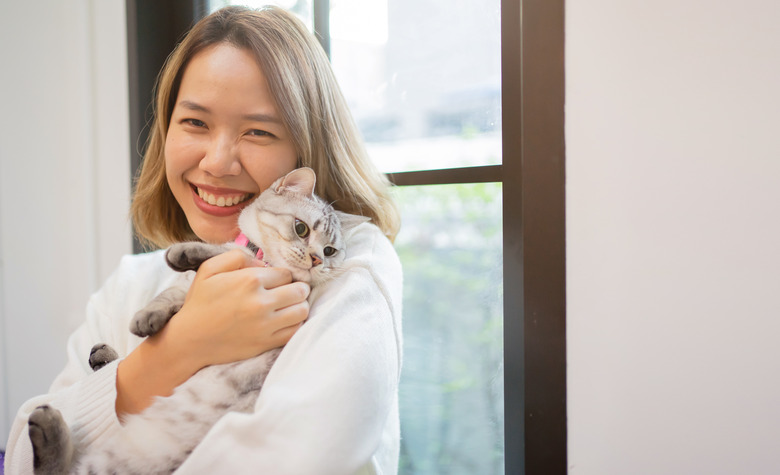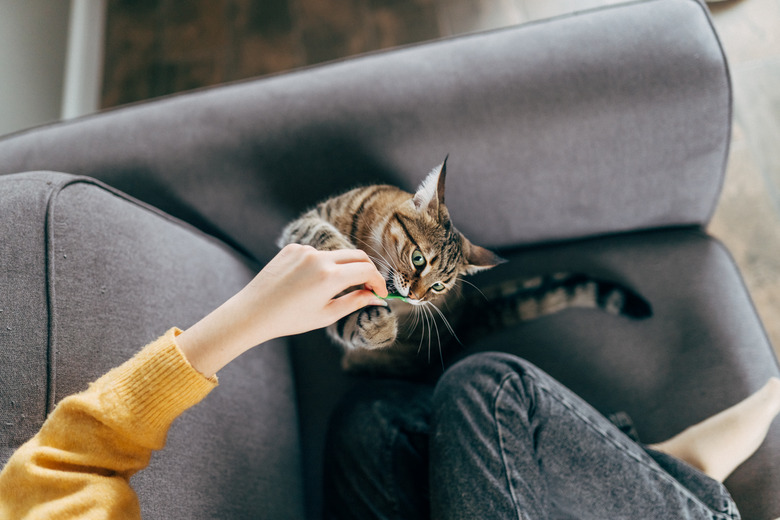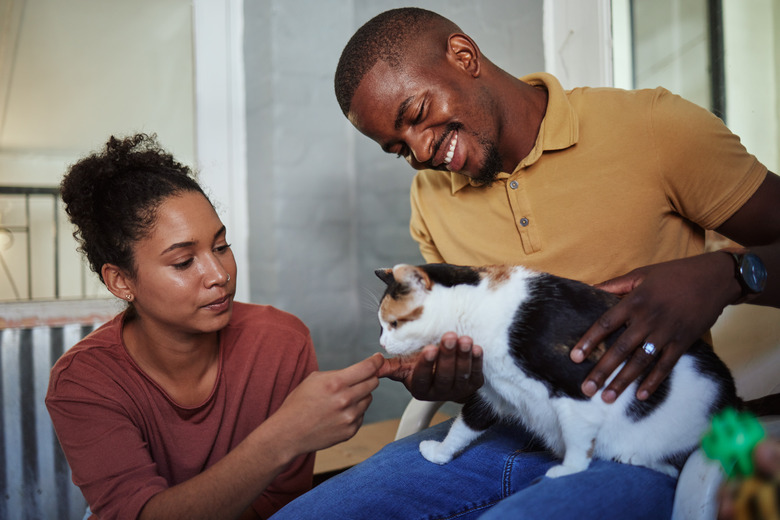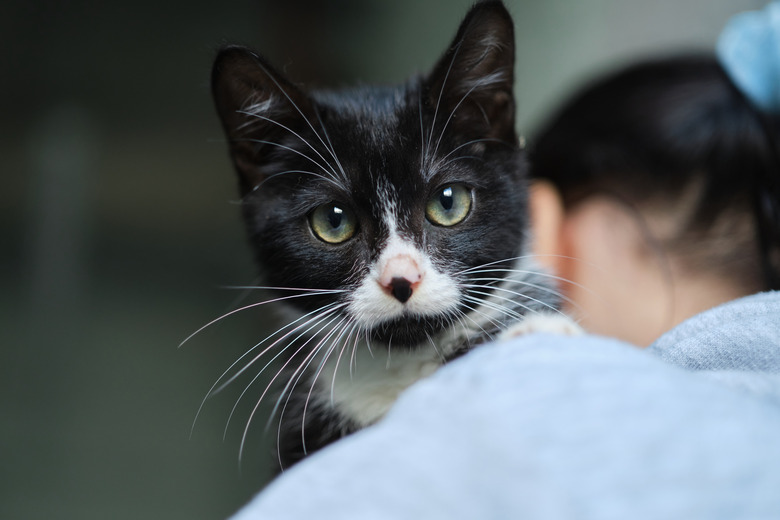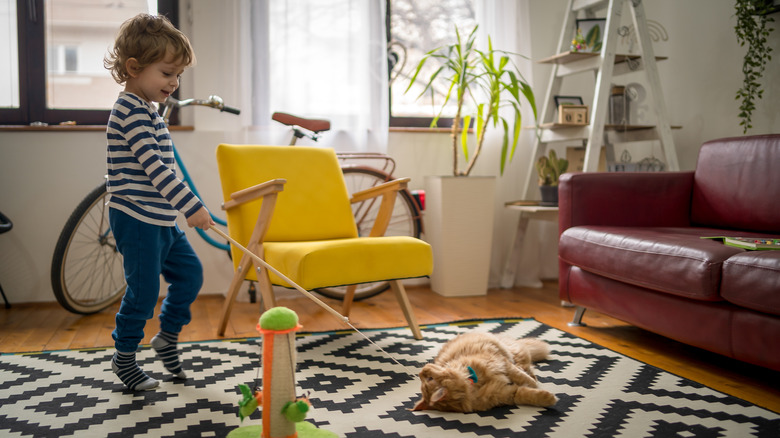Do Cats Mimic Their Owners? Cat Personality Traits Can Come From Their People
You've probably heard about, or noticed, people who look a little similar to their pets, but have you ever noticed that some pets act like their human caretakers? Maybe you've seen a calm person with a laid-back cat, or a high-strung human with a more nervous animal . . . could this be a coincidence, or is it due to the nature of their relationship? Could copycats actually be a thing?
A 2019 study published in PLOS One set out to find the answer to that question. As part of the study, researchers from Nottingham Trent University surveyed over 3,000 cat parents and their feline friends to see if the human's personality affected how their cat acted. What they found was that certain traits among the human pet parents, like neuroticism and conscientiousness, did rub off on their feline companions.
These findings are very similar to studies done on the traits of parents and human children, so, if you hear someone call their cat their "fur baby," they're actually not too far off.
Overview of cat personality traits
Overview of cat personality traits
The study was conducted via online surveys, and measured each person's personality using the Big 5 inventory. The human behavior traits measured in this inventory include agreeableness, conscientiousness, extroversion, neuroticism, and openness. Then, the owners assessed their cats by answering survey questions about their breed type, behavioral styles, physical health, and how they acquired the cat (was the cat a rescued, non-pedigree cat, or did it come from a breeder?) According to this study published in NCBI, cat behaviors are measured in five categories as well: agreeableness, dominance, extraversion, impulsiveness, and neuroticism. Then, the researchers compared the information to draw patterns.
How a cat's personality can reflect their owner
How a cat's personality can reflect their owner
What the study found was that, in the same way that a parent's personality can directly affect the personality of a child, the domestic cat can also be affected by how their caretaker acts and feels. Anxious people tended to have more anxious cats than their more agreeable peers, and vice versa— open people who didn't fuss over their cats so much had much more laid-back, and healthy, feline friends.
Energy levels
The study found that people who scored higher in areas of extroversion, conscientiousness, and agreeableness had cats who exhibited more "healthy" behaviors, such as higher energy levels. This was likely due to the fact that more of the people who scored in these ranges were more inclined to allow their feline friend access to the outdoors than their neurotic peers.
Social tendencies
The people who self-assessed as more neurotic seemed to have more cats with so-called "behavioral problems." These issues included increased anxiousness and fearfulness. More interestingly, cats with neurotic cat lovers for parents also displayed more illness related to stress, and were generally more overweight or had other medical conditions than their more agreeable or conscientious-raised cohorts. In fact, the more agreeable people noted having a more satisfying relationship with their cats than the people from the neurotic group.
When a pet parent has more people over, a cat can be more outgoing
So, what is it that makes cats happier? One thing that this study finds is that social engagement led to more emotional stability among cats. Cats are natural hunters and curious beings, and require certain levels of enrichment activities to meet all of those needs. This is especially true for cats who live indoors full-time — your cat might be a fan of running water, or might like to chase wand toys, but whatever it is, providing activities for house cats is essential to their physical and mental well-being. Not unlike human children, cats can become more extroverted when they have access to more positive examples of people, as well.
Emotional connection
What is it about neuroticism that results in unhappier and unhealthier cats? One thing that this study suggests is that a person's inability to maintain emotional interactions that are positive can affect the overall "tone" of a household. This can look like chaos and uncertainty, and/or strict authoritarianism, depending on the person. In children, these dynamics produced kids who were shyer and less emotionally regulated, and the same thing applies to domesticated animals such as cats. On the other hand, parents who had structured but gentle parenting styles resulted in more agreeable children, and the same seems to be true for the cats participating in this study.
An independent cat may have an owner who is more self-sufficient
Cats are often dismissed as being aloof creatures, but independence and self-assuredness is different from anxious or aloof behavior. This study found that conscientious pet parents had cats who were less aggressive, anxious, and avoidant, but instead, experienced cats who had more gregarious behavior styles. This can be displayed through vocalization, like meowing or purring, along with other socially healthy behaviors, like communicating through scent marking.
This social dynamic pattern is true across the board — an anxious owner may have a more anxious cat, while an owner who engages with toys may have a cat who likes to play. The environment your cat is in, and the amount of socialization they have access to within that environment, can affect their personality and behavior, just like it would for children or dogs.
Building strong bonds with cats
Building strong bonds with cats
If you want to build a strong bond with your cat but find your own personality to lean neurotic much of the time, that's OK! You can still have a fairly well-adjusted cat by building a relationship built on trust and safety. One way to do that is to implement a routine with your cat, like regularly timed feedings, or keeping a somewhat predictable bedtime most nights. Keep their litter box clean, their food and water bowls fresh and full, and you're on your way to a great relationship with your cat.
Another great way to bond with your cat is to provide enriching activities for them to engage in. Not only will this quell boredom, it can also relieve stress, and provide fun in the home, which can make a happier, healthier cat all around. Great enrichment ideas for cats include fountain water dispensers, window perches, scratching pads, cat towers, and enrichment mats, to name a few.
However, because it's said that 30 to 60% of behaviors are inherited at birth, engaging and socializing with your cat isn't necessarily a guarantee that your cat will be a well-adjusted delight to be around all of the time. Just do your best, keep them clean, fed, exercised, and mentally stimulated, and they'll likely love you for who you are, neuroses and all.
